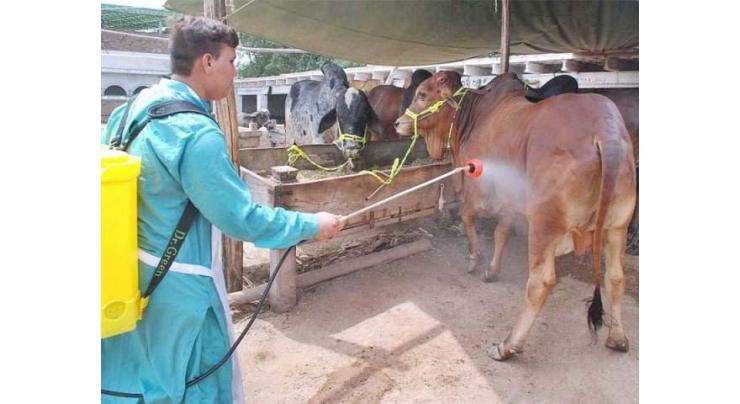
NIH Issues Advisory On Congo Hemorrhagic Fever
Muhammad Irfan Published June 20, 2023 | 09:21 PM

The National Institute of Health (NIH) has issued an advisory on the prevention and control of Crimean Congo Hemorrhagic Fever (CCHF) and Primary Ameobic Meningo-encephalitis (PAM), Naegleriasis
ISLAMABAD, (UrduPoint / Pakistan Point News - 20th Jun, 2023 ) :The National Institute of Health (NIH) has issued an advisory on the prevention and control of Crimean Congo Hemorrhagic Fever (CCHF) and Primary Ameobic Meningo-encephalitis (PAM), Naegleriasis.
According to NIH, the Institute's Field Epidemiology and Disease Surveillance Division (FEDSD) issued advisories with the purpose to sensitize human and animal healthcare authorities to further strengthen and improve the level of preparedness in the prevention and control of CCHF and Naegleriasis.
In the wake of high disease transmission and risk due to anticipated increased human-animal interaction during the upcoming Eid-ul-Azha, it is imperative to be vigilant about the situation and take necessary steps to interrupt the transmission of CCHF.
Crimean-Congo Hemorrhagic Fever (CCHF) is a widespread disease caused by a tick-borne virus (Nairovirus) of the Bunyaviridae family. Numerous wild and domestic animals, such as cattle, goats, sheep and hares are carriers of this virus.
The CCHF virus is transmitted to people either by tick bites or through contact with infected animal blood or tissues during and immediately after slaughter. Transmission to humans occurs through contact with infected ticks or animal blood. CCHF can be transmitted from an infected person to another person by contact with infectious blood, secretions, or body fluids.
According to the advisory, this year, Balochistan has reported 81 and KP reported three suspected cases, out of which 27 were positive from Balochistan including five deaths up to June 2023. There is currently no vaccine available for humans and the only way to reduce infection is by raising awareness.
As per the advisory, the public health advice should focus on several aspects including wearing protective clothing (long sleeves, long trousers), wearing light-colored clothing to allow easy detection of ticks on the clothes and using approved insect repellent on the skin.
Insect repellents are the most effective in warding off ticks in human populations besides avoiding to visit areas where ticks are abundant and seasons when they are most active.
Naegleria Fowleri is an amoeba, (also known as brain-eating amoeba) is a single-celled, thermophilic, free-living pathogen found widely in freshwater environments like warm bodies of fresh water, such as lakes, rivers, hot springs and even in the soil.
Despite lower incidence, the PAM disease is also widely distributed in tropical areas and mostly occurs during hot summer months. Most cases of PAM arise from freshwater sources like lakes and pools, but an increasing number are now linked to drinking water systems. Deaths related to PAM have been regularly reported from Karachi and some other parts of the country since 2008.
With three recently reported cases in 2023, the total count of cases has climbed up to 150 in the country during the last 14 years.
The NIH recommended that during recreational activities like swimming, avoid diving and getting water up in the nose, try to avoid water-related activities when the water is not chlorinated, empty and clean small collapsible bathing pools daily, ensure swimming pools and spas are adequately chlorinated and well maintained, avoid jumping or diving into bodies of warm freshwater, avoid putting head under water in hot springs and other untreated geothermal waters and if using un-chlorinated water, don't allow water to go up in nose when bathing, showering or washing the face.
Related Topics
Recent Stories

Sharjah Animation Conference explores cross-cultural collaboration opportunities ..

Sharjah Public Library provides countless opportunities for young imaginations t ..

Sharjah Police launches 'Your belongings, your responsibility' awareness campaig ..

Dubai Police displays Innovative Tourism Security Services at 'ATM 2024'

Mohammad Haris, Aamir Jamal not part of national squad for Ireland, England: Bab ..

Erdogan opens former church to Muslim worshippers

Cultural events hallmark of a nation, Director RAC

Iraq hangs 11 convicted of 'terrorism': security, health sources

Stocks rise on renewed hopes of rate cuts

PM assures all-out support to Saudi investment

S.Africa building collapse traps 48 workers: city hall

Nilofar lauds efforts for development of national document aimed promoting balan ..
More Stories From Pakistan
-
Provincial capital endures scorching heat
3 hours ago -
SU to conduct semester examinations from May 20
4 hours ago -
Progress, prosperity of Balochistan, among govt’s top priorities: President
4 hours ago -

Cultural events hallmark of a nation, Director RAC
4 hours ago -

PM assures all-out support to Saudi investment
4 hours ago -

Nilofar lauds efforts for development of national document aimed promoting balanced approach to pare ..
4 hours ago
-

US Amabassador Donald Blome calls on Opposition Leader in NA Omar Ayub
5 hours ago -

President Zardari's visit to have positive effects on political, economic situation of Balochistan: ..
4 hours ago -

0.5 mln tons of wheat to buy from farmers of Balochistan: Minister
5 hours ago -

Transforming Punjab Agriculture Plan to be game changer for farmers: Minister
5 hours ago -

5th meeting of KP cabinet held; takes various decisions
5 hours ago -

2 minors dead, 4 injured in Bannu roof collapsed
6 hours ago








